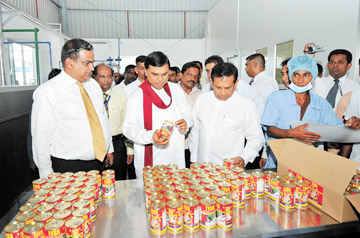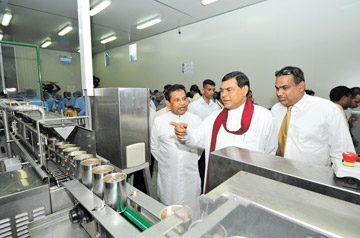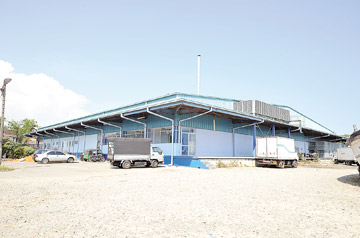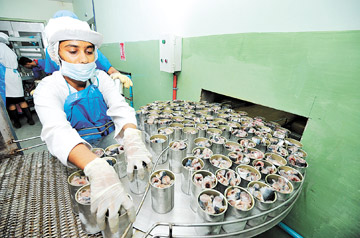|
Due to opening of new factories:
Sharp drop in canned fish imports
By Mohammed NAALIR
There is a drastic reduction in the
import of canned fish into the country as canned fish factories produce
nearly a third of the country's requirement in canned fish.

Ministers Basil Rajapaksa and Rajitha Senaratne inspect the TESS
salmon cans at Peliyagoda
plant. |

Economic Development Minister Basil Rajapaksa and Fisheries and
Aquatic Resources
Development Minister at the Peliyagoda fish canning plant. |
 |
| Galle fish
canning factory. |
 |
| Processed fish
is being canned. |
According to Fisheries and Aquatic Resources Development Minister
Rajitha Senaratne, Sri Lanka imported Rs. 5,120 million worth canned
fish last year. During 2010-2011, we have spent Rs. 210 million on
importing canned fish.
Minister Dr. Rajitha Senaratne paid his gratitude to President
Mahinda Rajapaksa for giving a helping hand to improve this industry.
Three canned fish plants have been set up in Galle, Mundalama, and
Peliyagoda under the "Mahinda Chinthana" national development concept.
Sri Lankans consume nearly 120,000 salmon tins per day and large amounts
of money is spent on the import of canned fish every year.
The plants can produce nearly 45,000 salmon tins per day. Moves are
in place to double production. Another giant plant will be set up in Sri
Lanka with the participation of foreign investors.
The TESS Mackerel canned fish plant set up by Tropic Engineering
Supplies and Services Group at Peliyagoda produces 24,000 salmon tins
per day. This plant produces salmon tins under the brand name "TESS".
Tess Group was set up in 1980 and is the largest exporter of tuna to
European markets.Fisheries and Aquatic Resources Development Minister
Dr. Rajitha Senaratne had promised in 2011 that three canned fish plants
will be set up in Sri Lanka in 2012. He fulfilled his promise by setting
up three canned fish plants at the said locations, according to Ministry
spokesman D. S. Narendra Rajapaksa.
Sri Lanka's first salmon plant was set up in Galle as a joint venture
between the Ceylon Fisheries Corporation (CFC) and Happy Cook Lanka Food
Pvt Ltd.
This plant produces 10,000 salmon tins under the brand name
"Seafish". Plans are afoot double the production by the lapse of time.
The Mundalama plant in Puttalam produces 10,000 salmon tins per a
shift. When the shift was doubled production capacity will increase to
20,000 cans. Products of Mundalama plant is available under the brand
name "Sea queen" in the local market.
The salmon tins manufactured in Galle, Peliyagoda and Mundalama areas
available at the Fisheries Corporation stalls, Sathosa outlets, Multi
Purpose Cooperative Society (MPCS) stalls and the open market.
When the shift is doubled daily production will increase to 90,000
tins.
Linna fish is used in canned fish production, but Linna is available
only during certain periods. Linna fish is used to breed Balaya,
Kelawalla and other big fish varieties. The canned fish plants plan to
purchase Linna fish from local fishermen when sufficient fish is caught
and to import from China at low price when a shortage arises.
Every fish variety can't be used to produce sardines. Linna and
mackerel varieties are used.
Linna is used in Sri Lanka. Countries which produce sardine import
Linna fish from other countries where excessive Linna fish is found.
Over 1,000 people have been provided employment in Galle, Peliyagoda
and Mundalama canned fish plants while providing large number of
indirect employments.
Linna is bred for a short period and is the food of larger varieties.
"I held discussions with the Treasury and obtained tax relief for the
import of mackerel fish varieties. We can import mackerel when a
shortage arises in Linna fish. We will be able to supply processed
canned fish to the market at lower prices", he said.
Last year we imported 19,589 metric tons of dry fish at a cost of Rs.
2,708 million while importing 27,583 metric tons of dried sprats at a
cost of Rs. 4,328 million and Rs. 1,358 million worth of Maldive fish.
Over Rs. 16,000 million was spent on the import of these items.
Under the Divi Neguma program we started Maldivian fish production.
The "Divi Neguma" is the only program which spends Rs. 1 million for
each Grama Niladari Division. Nearly 25 percent of Divi Neguma
beneficiaries are fishermen. Fish production has increased to 440,000
metric tons in 2011.
The Minister said that 21 percent of this country's children were
suffering from malnutrition. The WHO has instructed to reduce
malnutrition to 12 percent. Our aim is to bring the malnutrition to zero
percent.
The shortage of protein is the cause for malnutrition. Seventy
percent of animal protein is obtained from fish in Sri Lanka. Now it has
increased to 80 percent.
We were able to promote fish consumption to 35 grams per person. The
Fisheries Ministry aims to increase consumption to 60 grams by providing
fish at reasonable prices.
The Minister noted that Sri Lankans consume 6,000 to 8,000 metric
tons of Maldive fish per year. The Minister expressed confidence that we
will be able to produce our required amount of Maldive fish in this
country by next year. Then over US $ 400 million can be saved.
The Minister said when we earn Rs. 21,000 million we spend Rs. 14,000
million on imports. We save only Rs. 7,000 million.
Our attempt is to bring this expenditure down.There was no truth in
the allegation that fish canning factories were importing its entire
fish requirement from China, according to Dr. Senaratne.
He said that there should be enough room to breed large fish when
catching Linna fish. It is not possible to purchase the entire
requirement from local fishermen, plant owners were compelled to import
mackerel fish from China to meet the requirement, he said.
Dr. Senaratne said that moves are under way to produce all canned
fish requirements by the end of 2016. Explaining the benefit of fish
imports, he said there was no financial disadvantage to the country or
any harm caused to the country's fisheries industry.
Ministry spokesman Narendra Sri Rajapaksa said, `If we could import
fresh fish it can halve the value of the foreign exchange expended on
importing canned fish.`
|


